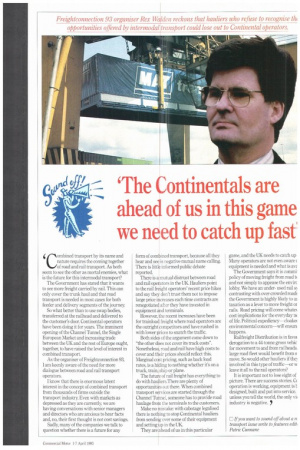rtc ( P The Continentals are
Page 47

If you've noticed an error in this article please click here to report it so we can fix it.
ahead of us in this game we need to catch up fast
c
C ombined transport by its name and
nature requires the coming together of road and rail transport. As both seem to see the other as mortal enemies, what is the future for this intermodal transport?
The Government has stated that it wants to see more freight carried by rail. This can only cover the trunk haul and that road transport is needed in most cases for both feeder and delivery segments of the journey.
So what better than to use swap bodies, transferred at the railhead and delivered to the customer's door. Continental operators have been doing it for years. The imminent opening of the Channel Tunnel, the Single European Market and increasing trade between the UK and the rest of Europe ought, together, to have raised the level of interest in combined transport.
As the organiser of Freightconnection 93, I am keenly aware of the need for more dialogue between road and rail transport operators.
I know that there is enormous latent interest in the concept of combined transport from thousands of firms outside the transport industry. Even with markets as depressed as they are currently, we are having conversations with senior managers and directors who are anxious to hear facts and, no, their first thought is not cost savings.
Sadly, many of the companies we talk to question whether there is a future for any form of combined transport, because all they hear and see is negative mutual name calling There is little informed public debate reported.
There is a mutual distrust between road and rail operators in the UK. Hauliers point to the rail freight operators' recent price hikes and say they don't trust them not to impose large price increases each time contracts are renegotiated after they have invested in equipment and terminals.
However, the recent increases have been for trainload freight where road operators are the outright competitors and have rushed in with lower prices to snatch the traffic.
Both sides of the argument come down to "the other does not cover its track costs". Nonetheless, road and rail have high costs to cover and their prices should reflect this. Marginal cost pricing, such as back load rates, is a hiding to nothing whether it's on a truck, train, ship or plane.
The future of rail freight has everything to do with hauliers.There are plenty of opportunities out there. When combined transport services are started through the Channel 'runnel, someone has to provide road haulage from the terminals to the customers.
Make no mistake: with cabotage legalised there is nothing to stop Continental hauliers from sending over some of their equipment and setting up in the UK.
They are ahead of us in this particular game, and the UK needs to catch up Many operators are not even aware c equipment is needed and what is arri The Government says it is commi policy of moving freight from road tt and not simply to appease the envirc lobby. We have an underused rail sr contrasting with over-crowded road: the Government is highly likely tow taxation as a lever to move freight or rails. Road pricing will come whate\ cost implications for the everyday m of life. Political expediency—cloaket environmental concern—will ensure happens.
Railfreight Distribution is in favor derogation to a 44-tonne gross vehic for movement to and from railheads. large road fleet would benefit from s move. So would other hauliers if the] involved in this type of traffic—or w leave it all to the rail operators?
It is important not to lose sight of picture. There are success stories. Cc operation is working, equipment is designed, built and put into service. unless you tell the world, the only vi' industry is negative.
E If you want to sound off about a n transport issue write to features edit' Patric Cunnane




















































































